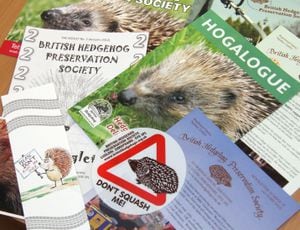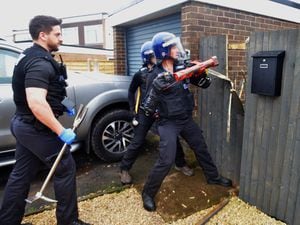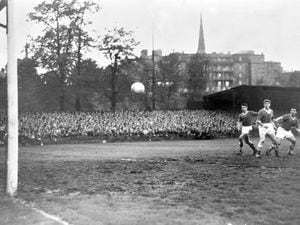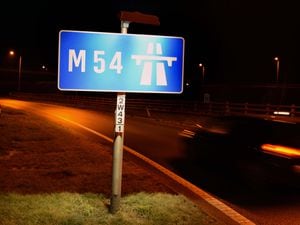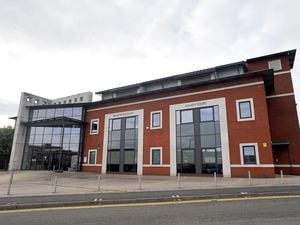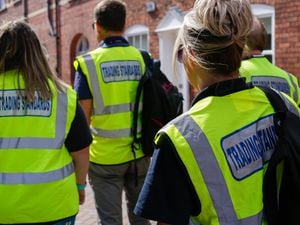Flashback to October 1982
1982
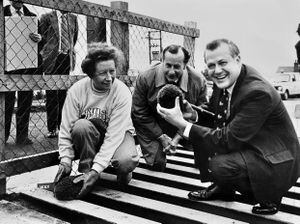
You're a hedgehog. You want to cross a cattle grid. Oops – you've fallen into the pit. Who is going to save you?
Major Hedgehog, that's who. Or, as known to the public...er...Major Hedgehog. Which Major Adrian Coles didn't seem to mind.
As a champion of the spiky little creatures it was as a result of his campaigning that cattle grids were given hedgehog escape ramps, so any hedgehog which had fallen in would be able to get out again.
In speaking up for the humble hedgehog he captured the public's imagination and made headlines around the world. So when the first hedgehog-friendly cattle grid at Clee Hill in south Shropshire was formally opened on October 18, 1982, television crews, large numbers of journalists, and locals, all gathered to watch.
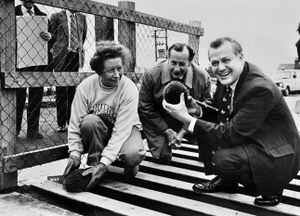
Major Coles, chairman of the British Hedgehog Preservation Society – which he had founded – had persuaded Shropshire County Council to install the escape ramps in all new cattle grids and where maintenance was being carried out on existing grids, to save the lives of the hundreds of hedgehogs which were dying every year, trapped in the drainage pits below the grids, where they starved or drowned.
He brought with him two hedgehogs to demonstrate the effectiveness of the ramps, although they were so put off by the commotion and attention that they proved reluctant to perform.
That inaugural hedgehog ramp-equipped cattle grid was formally opened by the chairman of the county council's planning and transport committee, Councillor Simon Kenyon-Slaney.
Major Coles had with him a cheque for £1,000 which was going to London University for research into hedgehogs. The money, he said, had been donated by hedgehog lovers from all over the country.
On the day four wags from Welshpool impishly almost stole the show by claiming to make special hedgehog flavoured crisps, and even wore special T-shirts urging the public to try them. Afterwards Phil Lewis, licensee of the Vaults pub in the Welsh town, admitted it was all in fun, and the crisps were actually made from pork meat flavoured with spice, and not with "essence of hedgehog" as they had claimed.
While that had been a gag, a plan by a fortune-teller on Blackpool pier to demonstrate how her Romany ancestors used to prepare hedgehogs for eating was not. It was one of Major Coles' victories when he managed to get her to drop the hedgehog cooking demo.
The roots of Major Coles' campaign seems to have been plans by Clee Hill Commoners Association in 1980 to build a network of gates and grids to prevent sheep and cattle straying onto the roads.
Major Coles, a county councillor who lived at nearby Knowbury, highlighted the danger to hedgehogs from cattle grids at a commoners' meeting in March that year. He had already taken some direct action when he had fished out a trapped hedgehog with a saucepan, and suggested the cattle grids could have little ladders.
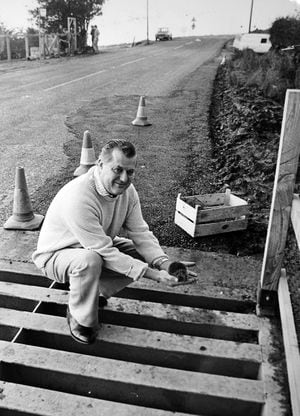
And things took off from there. His British Hedgehog Preservation Society began in 1982 and soon attracted international members from countries which didn't even have any hedgehogs. Its first anniversary was marked with a special "Hedgehog Bitter" (no hedgehogs were harmed, etc...) brewed at the independent Wood brewery at Wistanstow, near Craven Arms.
He began to appear on national television programmes such as Blue Peter and News at Ten, as an authority on all things hedgehog.
It should be recorded though that there was much more to him than his hedgehog campaigning. Major Coles, who had moved to Shropshire at the beginning of the 1970s, was a parish, district, and county councillor in Shropshire for some 40 years, as well as holding a raft of other public roles, including as vice chairman of West Mercia Police Authority.
He was awarded an MBE for his services to the community in 2000, was an Honorary Alderman of South Shropshire and a Freeman of the City of London, where he returned to become a Chelsea Pensioner in his later years.
One of his successful campaigns was to have the law changed so household electrical items had to be sold with a correct sealed unit plug, rather than with bare wire.
He died peacefully at the Royal Chelsea Hospital in 2017 aged 86.
Meanwhile the British Hedgehog Preservation Society continues its work championing hedgehogs, which unfortunately are in serious decline, with urban populations falling by up to 30 per cent and rural populations by at least 50 per cent in the last 20 years.
